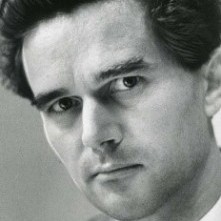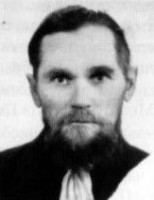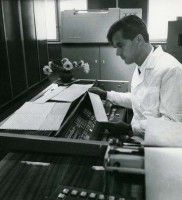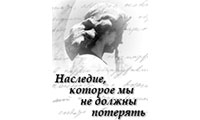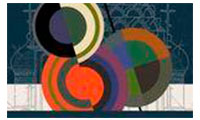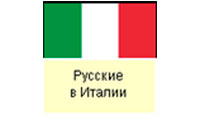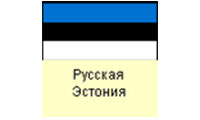Nikolay Andreyev
Nikolai Andreev (24th of August 1930, Daugavpils district, Republic of Latvia – 19th of August 2002, Riga, Republic of Latvia) – a cardiologist, a professor, the initiator of and director of the Latvian Scientific Research Institute of Cardiology (1977-1990), Honored Doctor of the Latvian SSR (1980).
Nikolai Andreev was born in the village of Biķernieki, Daugavpils district, into a family of Latgalian Old Believer peasants. For many generations, the Andreev family had lived in these lands long before the Nikonian reforms. In the family, a Pominalnaya kniga (“Book of Remembrance”) was carefully preserved — a centuries-old handwritten volume made of thick waxed paper with a wooden, leather-bound cover, containing the names of “departed ancestors” dating back to distant times. The family owned a large and diverse library, which included liturgical books, works of journalism, and philosophical writings.
His father, Andrei (1893–1982), was a respected man in the village — knowledgeable and hardworking. He took part in the First World War and served as a Latvian Rifleman. During the Second World War, he and his elder son Grigory were imprisoned in German camps, but escaped and returned home. His mother, Yevdokia (1904–1989), was a hardworking Russian peasant woman — kind and wise — who raised three children. His sister, Klavdiya (1923–1997), graduated from the Daugavpils Pedagogical Institute, worked at the Biķernieki school, and was awarded the title of Honored Teacher of the Latvian SSR (1968); she died tragically. His brother Grigory (1925–1944) was conscripted into the Red Army in 1944 and was killed near Jelgava.
Nikolai Andreev graduated with a silver medal from Daugavpils Secondary School No. 2 (1949) and with distinction from the Faculty of Medicine of the Riga Medical Institute (1958). After graduation, Professor A. Liepukalns offered him an assistant position at the Department of Surgery, but Andreev chose to return to his native Daugavpils. There he first worked as a district physician, then transferred to the internal medicine department of the city hospital, soon becoming its head. A year later, his wife Svetlana, a gynecologist and fellow graduate of the Riga Medical Institute, joined him in Daugavpils. N. Andreev was repeatedly invited to return to the Riga Medical Institute and to pursue postgraduate studies.
From a letter by Vice-Rector for Research Professor O. Kovsh:
“Because of your youth, you may not yet appreciate your own abilities. Believe us, your teachers: you possess a special kind of mind, and you should not work merely as a physician — you must be a scientist.”
In 1962, the young family returned to Riga. N. Andreev became an assistant at the Department of Propaedeutics and Diagnostics of Internal Diseases at the Riga Medical Institute and began postgraduate studies under Professor Kristaps Rudzītis, head of the Department of Internal Medicine, whom he considered his lifelong teacher:
“It was the original thinker, scholar, pedagogue, and creative physician K. Rudzītis who introduced me to science.”
According to his colleagues, N. Andreev inherited from his teacher an insatiable curiosity, extraordinary diligence, and a brilliant sense of humor.
During his postgraduate work, Andreev studied what was then still a little-known field — the treatment of rheumatism. Upon completion, he successfully defended his Candidate of Medical Sciences dissertation on “Changes in the Content of Mucoid Substances in the Blood in Rheumatism” (1965). Soon after, in 1971, he defended his doctoral dissertation, “Chronic Rheumatic Myocarditis: Clinical Picture, Biochemistry, Immunology,” in which he formulated the concept of chronic rheumatic myocarditis as a distinct clinical form of the disease. In 1974, his dissertation was published as a separate book, Chronic Rheumatic Myocarditis, by Zinātne Publishing House — a work that soon became a bibliographic rarity. In 1992, both of his dissertations were officially recognized (nostrified) in accordance with the academic degree system of the Republic of Latvia as Dr. med. (Doctor of Medicine) and Dr. habil. med. (Habilitated Doctor of Medicine).
N. Andreev continued to work as Professor at the Department of Propaedeutics and Diagnostics of Internal Diseases of the Riga Medical Institute, and from 1973 to 1995 had been its Head.
He co-authored several indispensable textbooks for students and physicians in Latvian: Iekšķīgās slimības (Internal Diseases, 1971), Arteriālās hipertensijas (Arterial Hypertension, 1981), and Praktiskā kardioloģija (Practical Cardiology, 1984).
N. Andreev took a keen interest in the potential applications of computing in medicine. From 1969, he had been serving as the chief specialist in medical cybernetics for the Ministry of Health of the republic, and from 1970 to 1978 he had been the Director of the Information and Computing Center. There a new and significant field emerged — the application of computing and mathematical methods for the diagnosis and prognosis of cardiovascular diseases and for the provision of preventive and therapeutic care to cardiac patients. For the development and implementation of the new methods for the prevention, diagnosis, and treatment of major cardiovascular diseases in the Latvian SSR healthcare system, the research team led by N. Andreev was awarded the State Prize of the Latvian SSR (1982).
In 1980, N. Andreev was awarded the honorary title Distinguished Doctor of the Latvian SSR.
At the same time, he worked as a practicing cardiologist, serving as the head of the Cardiology Center at the P. Stradiņš Republican Hospital. On his initiative, in 1977 the Latvian Research Institute of Cardiology was founded — the first cardiology research institute in the USSR — which he directed until 1990. Thus was realized the long-cherished dream of Andreev and his mentor, the founder of Latvian scientific cardiology, Professor K. Rudzītis. The Institute represented a unique scientific complex combining under one roof a cardiology treatment center, a university department of internal medicine (for medical education), and a research institute of cardiology (for scientific work). This integration of science, clinical practice, and education yielded remarkable results. The Institute effectively became an all-Union center for innovative research and its practical implementation. In its first decade alone, more than thirty authors’ certificates for inventions were obtained, over forty Candidate and Doctoral dissertations were defended, and numerous methodological guides for practitioners were published. In collaboration with the Institute of Organic Synthesis of the Latvian Academy of Sciences, the first calcium channel blockers were developed and introduced into clinical practice. For the development of the antihypertensive drug Foridon, a team of specialists including N. Andreev was awarded the Council of Ministers Prize of the Latvian SSR (1990).
In 1996, N. Andreev received the honorary title Emeritus Scientist of the Republic of Latvia. In 1998, Professor Andreev was invited to lecture on Internal Medicine and Geriatrics at the reestablished Faculty of Medicine of the University of Latvia.
Upon retirement, Nikolai Andreev developed an interest in geriatrics — a branch of gerontology dealing with the study, prevention, and treatment of diseases of old age — a field still little explored in Latvia. He accepted an invitation from the Biķernieki Railway Hospital to work as a consulting professor at the newly established Geriatric Center. There, N. Andreev studied the physiology of aging, consulted patients, and taught students. He collected extensive material in the field of gerontological science and clinical practice and began work on a book. However, his tragic death on August 19, 2002, cut short the life of this outstanding physician, scholar, and teacher.
His daughter and colleague, Dr. Tatjana Andreeva, completed the work, and in 2009 the book Praktiskā geriatrija (Practical Geriatrics, by Nikolajs Andrejevs and Tatjana Andrejeva) was published. As planned by N. Andreev, it was dedicated to his mentor, Professor Kristaps Rudzītis.
The scientific research of N. Andreev is remarkable for its breadth: rheumatology, cardiology, medical informatics, and geriatrics. He authored over 500 scientific publications, including eight monographs and textbooks. Under his supervision, twelve doctoral dissertations were defended. He was known as an engaging and fluent lecturer, teaching in Russian, Latvian, and English. For many years, he served on numerous expert and academic councils, commissions, and scholarly societies, and was a member of editorial boards of scientific journals — both in the USSR and abroad.
In May 2002, N. Andreev was awarded the highest state honor of the Republic of Latvia — the Order of the Three Stars, Fifth Class — for his multifaceted work as a clinician, educator, and scientist, and for his contribution to the development of medical science and healthcare in Latvia.
The life of Nikolai Andreev began in Biķernieki, Latgale, and ended in the Biķernieki Hospital in Riga. He was buried in his native Latgale, in the cemetery of the village of Krivosheyevo.
From colleagues’ recollections:
“He was an outstanding scholar, a talented physician, an organizer, and a capable leader.”
“He was responsive and always willing to share his life experience with the younger generation.”
“He was known for his simplicity, kindness, humor, abundance of jokes, phenomenal memory, knowledge, and practicality; he sang well and knew the words of many songs by heart.”
“He was familiar with church singing, which he remembered from his early school years when the Law of God was taught. He knew the 300-year history of his ancestors, the history of Latgale and the Daugavpils region from ancient times, and could freely read Old Church Slavonic texts, as he knew the language.”
“He lectured in Russian and Latvian, and for foreign students from Lebanon — in English.”
Text prepared by Erika Tjunina, based on personal conversations with Svetlana Andreeva, widow of N. Andreev.
Sources of information:
Светлана Андреева. «Николай Андреев. Жизненный путь». – Москва, 2019, 319 с;
100 nozīmīgas personas Latvijas medicīnas vēsturē: http://www.ieverojamiemediki.lv/a/andrejevs-nikolajs/ ;
Mūžībā aizgājis studiosus – profesors, valsts emeritētais zinātnieks Nikolajs Andrejevs // Latvijas Ārstu Žurnāls, 2002, 7./8. nr., 59. lpp.



